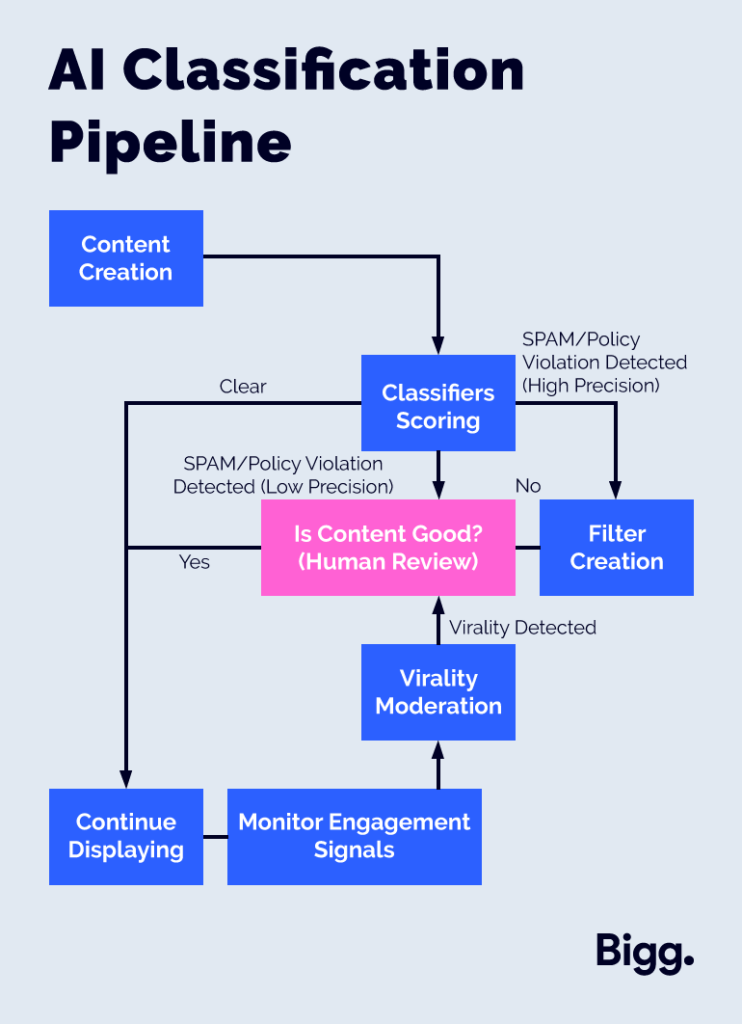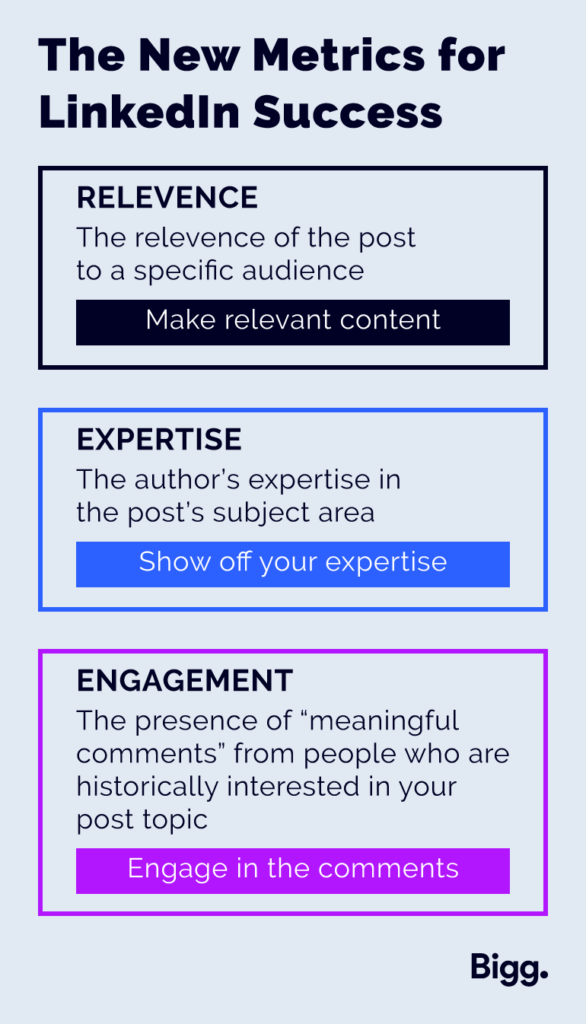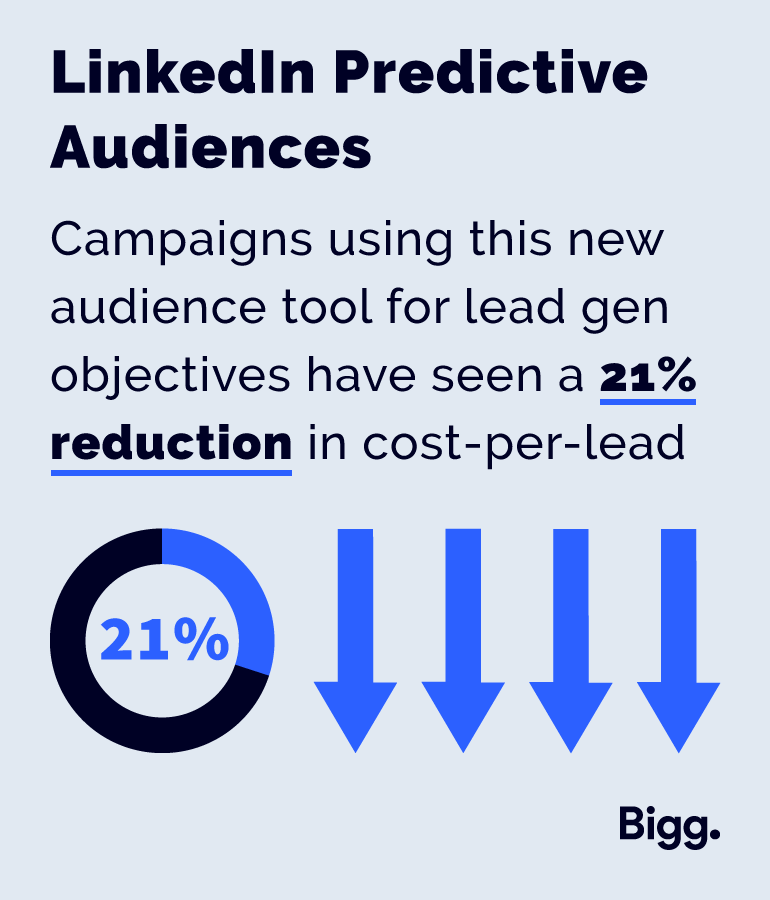LinkedIn, home to over a billion members worldwide, stands out as a key player for businesses aiming to up their marketing game. It’s not just a network; it’s a powerhouse for generating leads, with a vast majority of its members playing a role in business decisions and wielding twice the purchasing power of the typical online crowd.
Getting the most out of LinkedIn means mastering its unique algorithm, especially with its latest updates offering clearer insights into what flies and what flops. Plus, with recent tweaks to its paid advertising features, businesses now have even more tools at their disposal for insightful audience targeting and strategic campaign planning.
Staying on top of all these updates can significantly boost your business’s visibility and success on the platform – let’s delve into some of the key algorithmic features and recent product updates you need to be aware of in 2024.
What Is the LinkedIn Algorithm?
The LinkedIn algorithm is a sophisticated program designed to showcase engaging posts to users, ensuring that individual members encounter the most relevant content in their feeds.
As with many other social media platforms’ algorithms, it strives to optimise the user experience by observing the posts and profiles users interact with and tailoring their feeds to spotlight similar content. The overarching goal here is to enhance overall usage and engagement across the platform.
In short, the LinkedIn algorithm determines how content is prioritised within your feed and the extent of your own content’s reach within others’ feeds. LinkedIn provided a handy visual representation of the processes involved in assessing and distributing content following the recent updates:

How the Algorithm Works in 2024
LinkedIn is shifting its focus away from low-quality, “viral” content towards content from subject matter experts tailored to specific audiences. This approach is clearly working so far: from 2021 to 2023, LinkedIn reported an impressive 42% year-on-year increase in content shared and a 27% increase in content viewed.
Traditionally, “superficial” engagement served as a key indicator of relevance. However, recent insights suggest that its significance as a ranking signal has diminished and will continue to do so in the coming years. Meaningful, quality interactions now take priority – for example, comments that properly respond to the content of a post and incite discussion are favourable over basic, non-specific comments like “Agreed.” or “Congratulations!”
Additionally, as part of LinkedIn’s commitment to prioritising quality over recency, the algorithm now sorts feed content non-chronologically, meaning users may see older or more popular content ahead of new content.
Key Metrics for Organic Success
LinkedIn’s algorithm considers countless factors when determining a post’s reach, but the main ones to bear in mind following recent updates are as follows:
Post Quality
The algorithm assesses whether a post adheres to LinkedIn’s guidelines and professional community policies and the overall quality of the content when determining its reach:
- Clear, high-quality content will take priority
- Spammy content will be shown less frequently to users, if at all
- Low-quality content that is not considered spam will lie somewhere in the middle
Post Testing
Posts that pass the quality check undergo testing within immediate and extended networks, with engagement serving as a key metric. High, good-quality engagement signals post quality, prompting the algorithm to broaden its reach to a wider audience.
Member Activity
LinkedIn tailors content distribution based on user activity, considering interests, followed hashtags, and previous interactions. This ensures that posts reach users likely to engage meaningfully, enhancing overall engagement levels.
Member Expertise
The algorithm also assesses users’ expertise when determining the relevance and quality of their posts. This means your professional background, as outlined in your profile, plays a crucial role in influencing how the algorithm evaluates and distributes your content.
Relevance to Users
The algorithm prioritises content based on its relevance to users’ connections and extended networks. First-degree connections receive priority visibility, followed by individuals with whom the user regularly interacts. Factors such as the post’s topic, language and mentioned entities further influence visibility within the extended network.

In order to satisfy these metrics and increase your chances of success, you should craft content that not only resonates with a targeted audience but also highlights your expertise and fosters authentic engagement.
Recent Changes to Paid Advertising Tools
In addition to these changes to the algorithm’s content prioritisation and distribution process, LinkedIn recently announced some product updates affecting their paid advertising tools. Let’s take a look at a few of these important developments:
Discontinuation of Lookalike Audiences
On 29th February 2024, it discontinued its Lookalike Audiences function. This means that:
- Users can no longer create new lookalike audiences or edit existing ones.
- Current audiences became static – i.e. data is no longer being refreshed and updated.
- Active ad campaigns are still able to serve static audiences.
LinkedIn recommends marketers use predictive audiences and audience expansion instead.
Predictive Audiences: This tool leverages AI models and your existing source data to identify potential converters you should be targeting.
Audience Expansion: This tool helps you target new relevant buyers based on your campaign’s target audience.
Paid advertising campaigns can use these features to ensure continued dynamic targeting. These new tools offer a tighter, conversion-focused targeting approach, as opposed to loosely similar audiences identified by the Lookalike Audiences feature.

Introduction of Website Actions
LinkedIn is introducing the Website Actions tool to simplify website event tracking and conversion measurement. This feature can automatically capture critical on-site actions like button clicks and page views, providing further insight into buyer behaviour and interests. This can then make it easier to manage ad budgets, successfully retarget ads, and measure campaign performance.
Media Planning API
This new feature enables users to forecast campaign reach and frequency before spending, allowing for more strategic budget allocation and ultimately maximising return on investment (ROI). The advanced audience insights, efficient budget allocation and strategic planning capabilities brought about by this tool can also improve continued campaign optimisation processes.
Our Tips for LinkedIn Success in 2024
In light of these algorithm and product updates, it’s clear that LinkedIn is committed to continually refining its platform to foster quality content and meaningful engagement. Here are some expert tips for leveraging these insights to effectively enhance your LinkedIn presence in 2024:
Prioritise Quality Over Quantity: The algorithm’s shift towards valuing subject matter expertise and specific audience content means that quality trumps volume. Posts that offer clear, valuable insights aligned with professional standards are more likely to gain visibility.
Engage Authentically: Meaningful interactions are now more crucial than ever. Comments that foster discussion or provide thoughtful feedback are prioritised over generic responses. Engage with your network in a manner that adds value and encourages dialogue.
Optimise Your Profile: Your professional background significantly influences how your content is perceived and distributed. Ensure your profile clearly reflects your expertise and experiences to boost the relevance and reach of your posts.
Craft High-Quality Content: Adhere to LinkedIn’s guidelines and focus on creating posts that are informative, engaging, and relevant to your target audience.
Understand Post Testing: Recognise that initial engagement is critical. Prompt reactions from your immediate network can significantly expand your content’s reach.
Monitor Member Activity: Tailor your content to match your audience’s interests, utilising hashtags and topics they engage with, to increase the likelihood of meaningful interactions.
Showcase Your Expertise: Regularly share insights and updates related to your field to establish yourself as a thought leader and make your content more attractive to the algorithm.
Adapt to the Discontinuation of Lookalike Audiences: Shift your strategy to embrace predictive audiences and audience expansion tools for more refined and conversion-focused targeting.
Utilise Website Actions: This tool can provide deeper insights into how users interact with your website, enabling more precise retargeting and budget allocation.
Implement the Media Planning API: Use this feature to forecast and optimise your campaign’s reach and frequency for improved budget efficiency and ROI.
Enhance Your LinkedIn Strategy With Bigg
To thrive on LinkedIn in 2024, it’s essential to adapt to the changes we’ve outlined today. By focusing on quality content, prioritising authentic engagement and leveraging new advertising tools, you can enhance your LinkedIn strategy for better visibility and engagement.
Remember, success on LinkedIn now requires a nuanced understanding of your audience and how the algorithm prioritises content. Tailoring your approach with these insights in mind can significantly increase your chances of success on this ever-evolving platform.
At Bigg, we’re dedicated to helping you navigate the ever-changing landscape of digital marketing. With a strategic approach and a finger on the pulse of LinkedIn’s latest updates, we can help you unlock the full potential of this professional social platform and propel your brand to new heights in 2024 and beyond.

